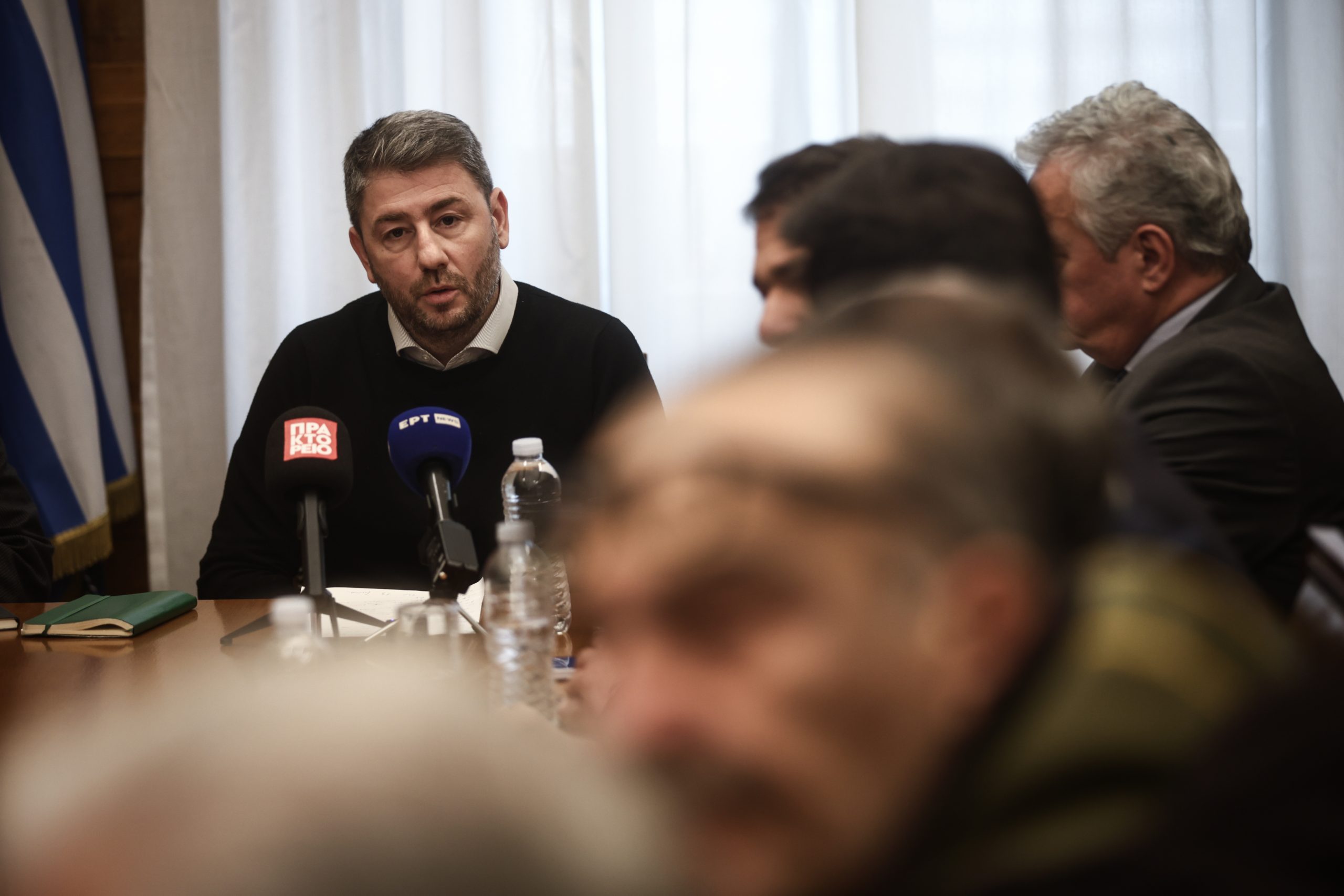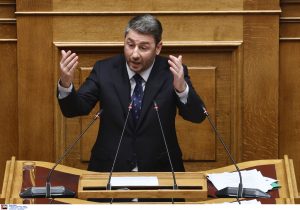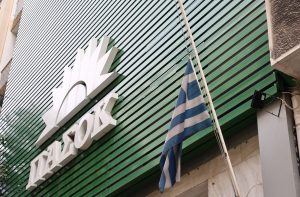Since his re-election (with 60 percent of party members and newly registered supporters in the second round) as party leader on October 13, 2024, Nikos Androulakis and his centre-left PASOK instilled great expectations in supporters of a restart that would allow the party to marshal all is forces to regroup and beat Prime Minister Kyriakos Mitsotakis in the 2017 general election.
Four months later, the polls offer no evidence of any such momentum.
Nearly two weeks before he was elected as leader, in a Pulse survey conducted for SKAI TV, PASOK was just three percentage points ahead of SYRIZA (13 versus 10), with ruling New Democracy garnering 24 percent.
Two months later the party had gained just one percentage point in a survey by the same pollsters.
ND’s steady decline
Though still solidly in first place in the June, 2024, European Parliament election, ND plummeted to only 28 percent of the vote (compared to 41 percent in the June, 2023, general election when it rose to power) followed by main opposition, left-wing SYRIZA with 15 percentage points and PASOK with 13 percentage points.
Main opposition role falls in PASOK’s lap after SYRIZA implodes
No one could have then predicted that after the election of Stefanos Kasselakis (again by registered and newly enlisted party members), the entirely new kid on the block in Greek politics, as SYRIZA leader in September, 2023, and his ouster from the party presidency by the central committee just one year later, would lead to the abandonment of the party by enough MPs to promote PASOK to the country’s de facto main opposition party.
In another Pulse poll, at the end of November, PASOK polled 14 percent just one percentage point higher than when Androulakis assumed the party leadership, and ND garnered 24 percentage points.
In late January, 2025, in a poll conducted by the same company, ND had risen considerably to 30 percent, a 14 percentage point lead over PASOK (16 percent) , indicating that the main opposition had reached a plateau. The poll (which factored in undecided voters) was published just three days before massive anti-government demonstrations, with tens of thousands of protesters in Athens, cities around the country, and Greek diaspora communities on 26 January.
PASOK’s proposed bank reforms
The main opposition prides itself over the fact that PM Kyriakos Mitsotakis has passed certain very limited banking regulations, to benefit the public, that it had earlier tabled.
They include limiting fees for transfer of funds between accounts by customers to .50 euros from the current 2.5 to 3.0 euros, abolishing fees for payments to the public sector, insurance funds, energy and water companies, and doubling as of 2026 real estate tax on properties owned by banks or servicers, so that 25,000 properties can be put on the market in order to somewhat curb galloping rent increases.
Luring back Simitis’s pro-reform electoral base
Androulakis’ strategy is to expand Pasok’s base by luring both centre-right and leftist voters (with one former SYRIZA MP, Rania Thraskia (a deputy from an electorally crucial district of Thessaloniki) switching from her independent status after leaving the left-wing party and transferring to PASOK.
At the same time, he seeks to woo back centre-right voters, including supporters of the late PM Costas Simitis’s erstwhile “modernising” (pro-reform) wing of PASOK.
This was evident in both the PASOK leader’s eulogy at Simitis’s funeral and, straight on the heels of the late PM’s death, in his nomination of Simitis’s highly unpopular labour minister, Tasos Giannitsis (a distinguished economist) to serve as President of the Republic. He garnered just a few dozen votes in the parliamentary process, finishing in last place.
Giannitsis is best remembered by his proposed sweeping reform of Greece’s ailing insurance system, and he later said that had his plan been implemented Greece would have avoided bankruptcy.
The draft legislation led to a huge popular uproar led by the country’s biggest labour unions, and Simitis, lacking even a majority of his own MPs, was forced to withdraw the reform.
But the nomination may have been designed to signal that Androulakis is not afraid to undertake necessary reforms, albeit unpopular at times, with the hope that Simitis’s centre-right base, or whatever is left of it, would find the message attractive
One might note that the politician heading up PASOK’s political planning, Anna Diamantopoulou, was a minister and devotee of Simitis. She ran unsuccessfully against Androulakis in the party leadership race.
Indications of Tempi cover-up batter government, without gain for PASOK
Like smaller opposition parties to its right and left, PASOK is attempting to ride the wave of popular outrage over the perceived cover-up of the facts of the Tempi train crash disaster that claimed 57 lives.
Yet popular rage is not limited to a government cover-up of the circumstances surrounding the deadly train crash, and its flawed handling of a parliamentary inquiry, where the ND majority blocked subpoenas of key witnesses, including Minister-to-the-Prime Minister Christos Triantopoulos.
The PM’s close associate in the first few days had coordinated on the ground the initial investigative operation and is said to have ordered the covering up of the site with earth and rubble. He denies that he gave the order, which presumably would have had to be approved by the PM in the case of such a national tragedy.
The inquiry panel was chaired by ruling party MP Christos Markopoulos, who heaped irony on witnesses and went as far as to say that the committee was a “lucky charm”, as two of its members were elevated to ministerial posts.
In a television interview, the PM conceded, with a touch of understatement that this inquiry was “not Parliament’s finest moment”.
He declared, two years after the fact he is more interested than anyone, save the relatives of the victims, in “finding out the truth”. The government is still waiting for the Athens Polytechnic to issue an expert report.
Crisis of confidence in government, state institutions
But the current popular rage is also fuelled other vital factors: Galloping inflation that has battered a middle class struggling to make ends meet, the economy in general and thriving cartels, and a distrust in state institutions and “systemic” parties (the public clearly views PASOK as one of them).
The transparency and independence of investigating magistrates and the judiciary more generally has also been called into question by the opposition and victim’s relatives, whose lawyers have been denied access to crucial evidence.
The popular rage derives from a pervasive crisis of confidence in state institutions, beginning with the judiciary, which is perceived as not handling the investigation of the case transparently and quickly.
Androulakis has proposed, for the next revision of the Constitution, reform of the judicial appointment process and a rule banning judges and prosecutors from holding a state position for four years after leaving the judiciary.
More mass demonstrations
On the second anniversary of the deadly crash, 28 February, massive protests over Tempi, the lack of transparency in the probe, and a crisis of confidence in the entire political system, have been organised in Athens’ Syntagma Square and in 58 cities around the country.
General strike to bring country to a halt
The country’s two biggest umbrella unions, GSEE (private sector) and ADEDY (public sector), train workers, the Greek Seamen’s Federation (PNO), air traffic controllers, university students and school students, and a host of other organisations will all participate in the strike.
PM Mitsotakis, and the few ministers that have strongly defended the government on the cover-up charges (most presumably so as as not to incur the wrath of their electoral base) has declared that an organised plot is underway to destabilise the government, and hence the country.
They see it as a plot to topple the government.
Rage hammers both government, opposition
A Metron Analysis poll presented on 20 February on MEGA TV shows that not only Mitsotakis, but Androulakis and PASOK are also taking a fierce beating.
A whopping 71 percent responded that the government is covering-up responsibilities for the train disaster, while only 26 percent believe that the judiciary will duly assign blame and punish those responsible.
Mitsotakis, Androulakis plunge in polls
Positive ratings for the government have tumbled to 24 percent, and 68 percent have a negative view of how the government is doing its job.
Mitsotakis has a 67 percent negative approval rating, 10 percentage points higher than two months ago.
Things are even worse for PASOK, as its vitriolic attacks on the government on Tempe and a variety of issues have failed to touch a popular chord.
Negative ratings of the party have surged from 58 percent two months ago to 75 percent today.
Positive ratings in the same period have dropped by 12 percentage points (from 26 to 14 percent).
As for Androulakis, his negative ratings, 72 percent, have risen by 15 percentage points since December. His positive ratings stand at just 18 percent, an 11 percentage point drop.









